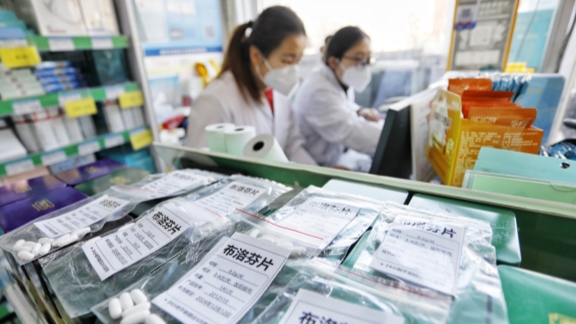To ensure adequate supplies of anti-epidemic drugs, comprehensive measures are currently being implemented to strengthen drug production and facilitate distribution.
Hebei Dongfeng Pharmaceutical Co., Ltd. has a full production line producing pain relievers, antipyretics and other over-the-counter medicines to treat COVID-19 symptoms. Among them, the daily production capacity of ibuprofen is 1.5 million tablets, which can meet the daily consumption of 300,000 people.
In Shenyang, the provincial capital of northeastern Liaoning, Northeast Pharm is working around the clock to manufacture paracetamol tablets.
The product is priced at 0.1 yuan (approximately US$0.014) per tablet. The drug’s surprisingly low price has caused the company to go viral online.
Sina Weibo user “Xuanhuai” said, “It is a great social responsibility to make medicines accessible and affordable to those in dire need. We all owe them a lot of gratitude.”
According to Liu Yaoguo, an official of the Shenyang Municipal Development and Reform Commission, there are 12 pharmaceutical companies in Shenyang, producing 40 kinds of antiviral drugs, antibiotics, antipyretics and cough medicines. “They are all operating at full capacity.”
In the meantime, various measures have been taken to speed up the flow of medical products and ensure smooth entry into the market and reach people.
At China Resources Pharmaceutical Group Co., Ltd., located in Xicheng District, Beijing, we are mobilizing distribution trucks of all sizes to speed up transportation.
One of the drivers, Ma Chunlin, packed more than 700 boxes into a truck before heading to a warehouse in Beijing’s Shunyi district.
With the support of the Beijing Municipal Medical Products Administration, a “green channel” for drug distribution has been set up, providing convenience for logistic distribution trucks carrying the delivery of drugs like Ma.
In the past week, it has supplied more than 3 million anti-epidemic drugs, including antipyretics, to more than 4,000 customers in Beijing, according to company data. These included 300 hospitals, over 2,200 community health centers, and over 1,500 retail pharmacies.
Since early December, Sinopharm Logistics’ second warehouse in Shanghai has successfully delivered over 3 million high-demand medicines to medical institutions in the city.
Chen Junfeng, Manager of Warehouse No. 2, said: He added that at least four trucks are on standby for urgent orders.
At a press conference earlier this month, the Ministry of Industry and Information Technology said priority will be given to the supply of medicines to key locations such as medical institutions and nursing homes for the elderly. A large pharmacy will be mobilized to develop his online platform to facilitate the delivery of medicines to patients in need.
JD Health International Inc., the healthcare arm of e-commerce giant JD.com, is working with express delivery companies to help more than 1,400 offline pharmacies in Beijing offer home delivery services.
